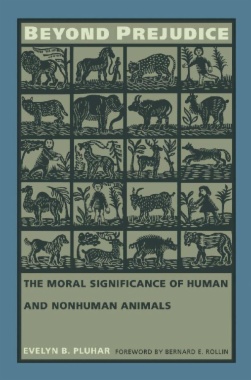In Beyond Prejudice, Evelyn B. Pluhar defends the view that any sentient conative being—one capable of caring about what happens to him or herself—is morally significant, a view that supports the moral status and rights of many nonhuman animals. Confronting traditional and contemporary philosophical arguments, she offers in clear and accessible fashion a thorough examination of theories of moral significance while decisively demonstrating the flaws in the arguments of those who would avoid attributing moral rights to nonhumans.
Exposing the traditional view—which restricts the moral realm to autonomous, fully fledged "persons"—as having horrific implications for the treatment of many humans, Pluhar goes on to argue positively that sentient individuals of any species are no less morally significant than the most automomous human. Her position provides the ultimate justification that is missing from previous defenses of the moral status of nonhuman animals. In the process of advancing her position, Pluhar discusses the implications of determining moral significance for children and "abnormal" humans as well as its relevance to population policies, the raising of animals for food or product testing, decisions on hunting and euthanasia, and the treatment of companion animals. In addition, the author scrutinizes recent assertions by environmental ethicists that all living things or that natural objects and ecosystems be considered highly morally significant. This powerful book of moral theory challenges all defenders of the moral status quo—which decrees that animals decidedly do not count—to reevaluate their convictions.
- Contents
- Foreword by Bernard E. Rollin
- Preface
- Chapter 1. Human "Superiority" and the Argument from Marginal Cases
- Candidates for Inclusion in the Moral Community
- Frequently Held Views on Who Counts Morally: Homocentrism
- Frequently Held Views on Who Counts Morally: The Full-Personhood View
- The Argument from Marginal Cases: Two Versions
- Chapter 2. Responses to the Argument from Marginal Cases
- Failure to Address the Issue
- Unsuccessful Attacks on the Argument from Marginal Cases
- The Scope of the Argument from Marginal Cases
- The Final Response
- Chapter 3. Speciesism and Full Personhood
- The Speciesism Debate: A Brief History
- Attempts to Show That Membership in a Species Characterized by Full Personhood Is a Morally Relevant Characteristic
- Attempts to Show That Speciesism Is Justified Even if Species Membership Is Not a Morally Relevant Characteristic
- Implications of the Failure to Justify Speciesism
- Chapter 4. Utilitarianism and the Protection of Innocent Life
- Utilitarianism and the Full-Personhood View
- Utilitarianism and the Charge of Inadequate Individual Protection
- Utilitarian Attempts to Reject the Replaceability Argument
- Rejection of the Extended Prior-Existence View
- Preference Utilitarianism and Replaceability
- Return to the Case of the Wretched Child
- Total-View Utilitarianism and Moral Rights
- Chapter 5. Justification and Judgment: Claiming and Respecting Basic Moral Rights
- Attempts to Provide Justification for the Moral Considerability and Significance of Beings Who Are Not Full Persons
- Justifying the Rights View
- Respecting Basic Moral Rights: Obligations and Conflicts
- Notes
- Bibliography
- Index

